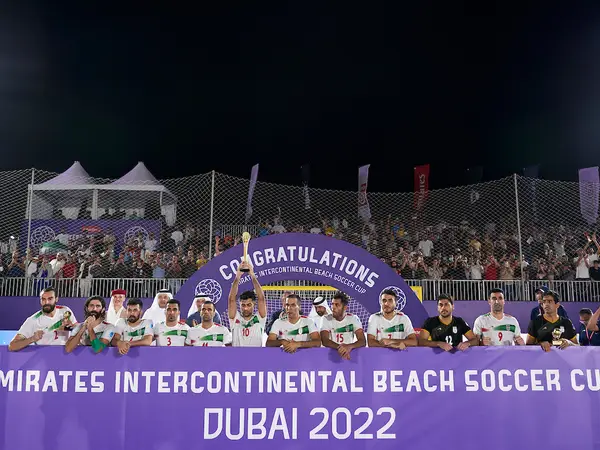Islamic Republic officials have issued threatening messages to members of its beach football team as well as the United Arab Emirates that recently hosted the Beach Soccer Intercontinental Cup.
In a short article published Monday by Iran Daily, the official mouthpiece of the government, the Islamic Republic threatened the UAE of consequences over its lack of action to stop spectators who chanted slogans against the Islamic Republic after a match between the Iranian and Emirati national teams in Dubai on Saturday.
Criticizing the UAE police for a lack of confrontation with the people, the paper said that the UAE government’s attitude is “not compatible with good neighborliness.”
It added that “if the country does not react appropriately [against spectators], it must accept the consequences of this anti-Iranian action,” threatening that UAE will soon see “the consequences of this hostile action.”
The Iranian beach football federation also issued a statement to downplay the protest by Iranian spectators, describing them as “unwise and opportunistic.”
The federation also threatened the players of the national squad for their acts of solidarity with the current wave of antigovernment protests, ignited by the death of 22-year-old Mahsa Amini in the hands of the hijab – or ‘morality’ -- police.
The national team players did not cheer or celebrate after winning the cup following their final victory against Brazil and also refused to sing the national anthem of the Islamic Republic at the beginning of their semifinal match against the UAE.
During the final, Iranian striker Saeed Piramoun expressed his solidarity with Iranian protesters by miming the hair cutting gesture after scoring a goal, a move that has drawn enormous appreciation by Iranian social media users and renowned footballers alike. His move has also inspired several graffiti and digital art pieces.
While the national anthem was being played before the match started, Iranian players seemed to have been forced to sing along this time, but the Iranians present at the stadium kept booing until it ended.
Vowing to punish the players, the Islamic Republic’s federation said according to regulations by world football governing body FIFA, players should avoid "any political act." It said some of the players did not observe "professional ethics."
Mentioning FIFA’s regulations is unexpected from the Islamic Republic’s authorities who have been ignoring such rules when it comes to allowing women into stadiums or female referees to officiate matches in men’s leagues.
Iranian President Ebrahim Raisi has expressed concern over possible problems that may happen during the FIFA World Cup scheduled to open later in the month. Earlier in November, he tasked the Foreign Ministry to contact Qatari officials regarding the issue to find ways “to predict and prevent possible problems."
Earlier in the month, FIFA President Gianni Infantino wrote to the World Cup teams asking them to concentrate on soccer in Qatar and not let ideological “battles” be dragged into football fields. “We know football does not live in a vacuum and we are equally aware that there are many challenges and difficulties of a political nature all around the world… [but] at FIFA, we try to respect all opinions and beliefs, without handing out moral lessons to the rest of the world,” Infantino said in his letter.
He wrote the letter in reaction to calls by a group of Iranian sports personalities and lawyers who have requested FIFA to eliminate Islamic Republic’s team from the World Cup.
Sosha Makani, the ex-goalkeeper of Iran’s national team told Iranians in a video on his Instagram late in October that it is wrong to go to Qatar to watch football matches because the Iranian regime will exploit their presence in stadiums to tell the world they support the Islamic Republic.
Since March, many Iranians have been urging FIFA to ban Team Melli from the World Cup for forcibly barring women from entering stadiums to watch matches. Under FIFA pressure, Iranian authorities started to let in a cherrypicked group of women so they would not face bans and penalties. However, since the start of the current uprising and a lackluster support from the national squad, the calls on FIFA to ban Iran have become stronger.
